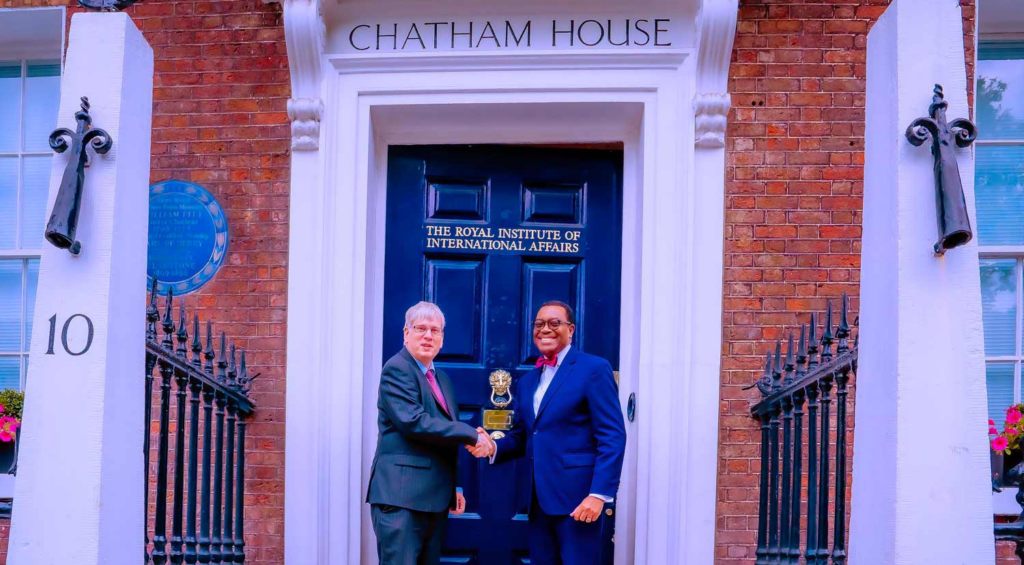- Financing is key to unlocking Africa’s development opportunities.
- Dr Adesina tells Chatham House: “Africa can no longer be ignored.”

ABIDJAN, Côte d’Ivoire, 10 June 2024 -/African Media Agency(AMA)/-In a packed auditorium at the renowned Chatham House, African Development Bank President Group Dr Akinwumi Adesina delivered an inspiring address to a diverse audience of diplomats, investors, academics, politicians, and media, emphasizing Africa’s untapped potential and abundant opportunities.
In his presentation on Friday, “Envisioning Africa’s Economic Prospects,” Adesina explained the reasons behind his optimism and passion for Africa.
The Bank Group president said Africa is a continent of tremendous opportunities. It is endowed with and characterized by a young, dynamic and vibrant workforce, massive renewable energy potential, abundant biodiversity resources, rapid regional integration and innovative solutions designed to unlock the continent’s vast natural capital.
Adesina outlined the resilience of Africa’s economies despite global challenges, noting that the continent remains the second-fastest-growing region after Asia. He cited the Bank’s African Economic Outlook Report, which shows the the continent’s 3.7% economic growth for 2024, increasing to 4.3% in 2025. The report which was launched during the Bank’s May Annual Meetings in Nairobi revealed that 15 countries achieved real growth rates of at least 5 percent, and half of the world’s 20 fastest-growing economies are in Africa.

However, he said achieving strong economic prospects and resilience will require overcoming some significant headwinds, including tackling climate change and rising debt, and through critical global financial reforms.
“As Africa’s economic resilience is bolstered, unlocking its economic prospects requires ensuring structural change of its economies, raising the productivity of agriculture, provision of electricity, accelerating infrastructure investments, supporting faster pace digitalization, unleashing economic and job opportunities for women and youth, and driving industrialization through greater mobilization of the private sector,” he stated.
Addressing infrastructure and agricultural production, Adesina shared successes like the Bank’s flagship Technologies for African Agricultural Transformation (TAAT) program, which has helped 13 million farmers to increase crop productivity. In Ethiopia, the distribution of 65 metric tons of heat-resistant wheat has led to self-sufficiency in wheat production, covering 2.2 million hectares.
The event, attended by over 150 guests in person and hundreds more virtually, included diplomats from more than 18 African countries, the Commonwealth Secretariat, international financial institutions, private and corporate investors, startups, civil society, students and academics from some of the UK’s leading academic institutions and international media houses.
Adesina acknowledged challenges such as youth unemployment, poverty, debt vulnerability, and political instability but dispelled perceptions of Africa as a risky investment destination. He referenced a 14-year Moody’s Analytics study showing Africa’s low infrastructure loan default rate at 1.9 percent, compared to between 4.6 and 12.4 percent in other regions around the world.
He reiterated the Bank’s advocacy for an independent African credit rating agency to counteract misperceptions that lead to underinvestment due to excessive risk premiums. Quoting the United Nations Development Program, Adesina said fairer credit ratings for African countries could save at least $75 billion annually in debt service payments.
“The trajectory for Africa will be much stronger as we tackle these challenges, as well as improve security and expand more concessional financing and private sector financing,” he emphasized.
Repositioning the Bank to do more
Adesina recalled the Bank Group shareholders’ recent approval of a $117 billion callable capital increase, raising the Bank’s total authorized capital to $318 billion to preserve its AAA credit rating and enhance its lending capacity. The approval announced during the just concluded 2024 annual meetings of the Bank will align the institution with the changing global financial architecture and enhance its support for the continent.
“We’re going to be bigger, bolder, and better,” he declared, predicting Africa’s rise as a pivotal global region.
Reflecting on the Bank’s achievements, Adesina highlighted the Bank’s successful launch of sustainable hybrid capital, marking the first such issuance by a multilateral development bank in line with the G20 Capital Adequacy Framework recommendations to boost lending capacity. The transaction won global commendation, including from the G7 finance ministers(link is external) and central bank governors.
Distributed by African Media Agency on behalf of African Development Bank

